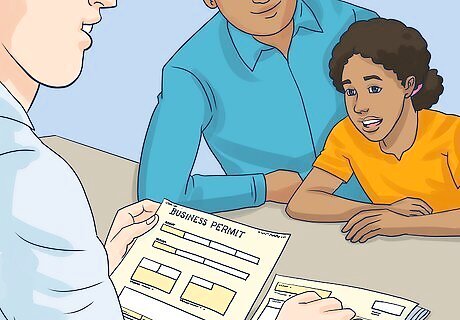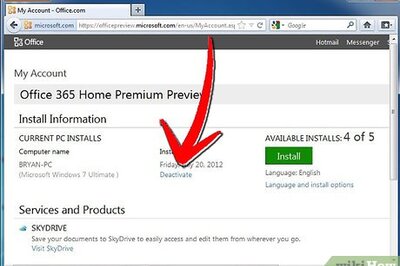
views
Developing a Business Plan

Write down a list of things you're passionate about. If you don't already have a business in mind, brainstorm some ideas. Make a list of the things you're really interested in. These don't need to be businesses, but just things you really enjoy. For example, you might enjoy music, building, athletics, or games. If you happen to think of business ideas too, that's great! For example, you might already know that you want to make bracelets and sell them at a neighborhood market. Or you may just write down that you enjoy dogs, playing the piano, or drawing.

Come up with a product or service to sell. Look at the list of things you enjoy and think of things you could make or do based on those things. This will be your business idea. For example, if you love kids, start a babysitting service or if you like crafting create small pieces of jewellery. If you enjoy drawing, make paintings or sketches to sell at local craft fairs. You could turn a knack for computers into a job designing apps. Once you've decided on a product or service, consider if you’re mainly interested in making money with the business or whether you'd be happier treating it like a hobby.

Gather the materials and training you'll need. Make a list of all the equipment you'll need and ask an adult to help you get them. It's also important to get training that's necessary for the job you want to do. For example, if you want to start a babysitting business, you should probably take first aid and childcare classes. You may be able to buy some simpler materials on your own if you have a little money to work with. For example, if you want to make bracelets, you can start by buying some beads and jewelry wire at a craft store. If you need larger equipment, such as a lawn mower, talk with an adult about borrowing or renting the machine.

Run your business (Also note you might not be able to do this with Covid-19 going around) in person if you like working directly with customers. If you choose to sell your product or market your services in person, find a location such as a booth or stall. Find out if there are any fees you need to pay in order to sell your items. To market services, consider going door-to-door and leaving flyers. For example, sell homemade candles at your town's weekly market. To advertise your landscaping business, you might leave door-hanging flyers in your neighborhood.

Create an online presence to help people find your business. Even if you're selling a service, it's a good idea to have a website so people can contact you, read reviews, and see what services you offer. Set up other social media accounts so you can show pictures of your work. Depending on how old you are, you might need your parents’ help to set up and run your online accounts. For example, if you baked a cake for someone's birthday party, ask the customer if you can share a photo of the cake at the party. Think about incentives you can offer customers. For example, offer a slight discount if they sign up for a regular service instead of a one-time service. You can also reach customers all over the world by running at least part of your business online!

Create a budget and look for investors. Make a list of all the supplies you'll have to buy, as well as things that will cost money once the business is going, such as advertising. Examine how much money you have available to start your business and how you're going to spend it. If you need money to start the business, ask your parents or family if they'd like to be investors. For example, take an itemized list of your business costs to your parents and tell them exactly how much money you need to start up. Offer to use some of your own money or give them control over certain business aspects, such as marketing. For example, if you're running a craft booth, list the fee for renting the space, the cost of tables or a tent, and the costs for your materials.

Set realistic goals for your business. While it's a good idea to have a few financial goals, such as making money after a month or two, keep in mind that there are other ways to succeed in business. Give yourself manageable goals such as: Building a customer base Selling your product or service in a new venue or area Getting new investors Getting good reviews from customers
Setting up a Legal Business

Create a name for your business. Choose something that will make you stand out from similar businesses and use the name when you're registering the business with your city. For example, instead of simply using your name with your product, like Beth's Beads, make a catchy name, like Bedazzled Bracelets. Run an online search for the business name so you can see if someone already has that business name in your area. If someone already has that name, then you can create a new name that fits your business. If you want, make an eye-catching logo with your business name. Include a slogan or motto to make it even more memorable.

Get a local permit and pay any required fees. Ask your parents to help you get a business permit. You'll have to go to the city hall or use the city's government website to access the application forms. You may also need to pay a fee (which is usually around $50 in the U.S.), but then you'll be legally allowed to operate your own business! If you're unsure of what's required to set up a legal business, contact a local small business association and ask for guidance. Check local community centers or do an online search for small business associations in your city.

Pay taxes if you make more than $400 in a year. Keep track of your income and expenses for the year. If you only have a few expenses, write them down in a notebook. For more complex expenses, use computer software to log them. If you earned more than $400, you'll have to pay self-employment tax. Your parents will still be able to claim you as a dependent for their tax purposes, but you'll have to pay taxes on your business. For example, if you made $825 and spent $200, you'd have to pay taxes because you earned $625. You may want to set aside 10 to 15% of your income so you're prepared to pay any taxes you might owe. Tax laws vary from one place to another. If you live outside the U.S., check your local laws to find out if you need to pay taxes on your business.

Distribute flyers or use social media to market your business. Make or print signs and flyers that you can leave at shops, community centers, grocery stores, or schools. Use social media to let customers sign up for newsletters, send coupons, or remind them of upcoming sales events. Ask your customers to leave reviews online to help spread the word about your business.

Reevaluate your goals if you're struggling. It's easy to be frustrated in the early stages of starting a business, but remember that your business needs time to grow! Build up a solid product or service and focus on taking care of your customers. If you feel like you're ready to give up, return to your goals and consider changing your deadlines or expectations. For example, if you haven't been able to turn a profit after 2 weeks, give yourself more time or set a goal of getting 2 new customers instead. If you came close to meeting a financial goal, try setting a few smaller goals that will help you achieve it.




















Comments
0 comment